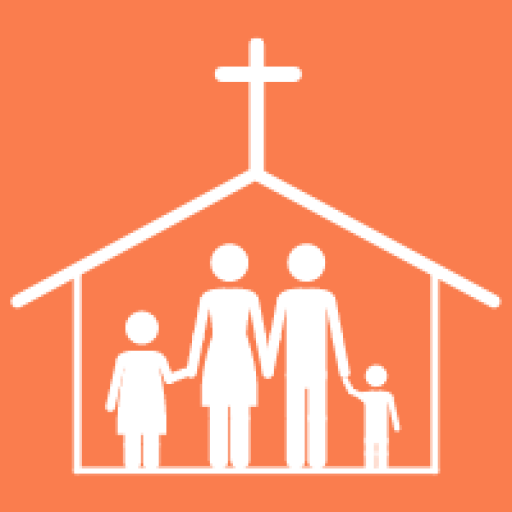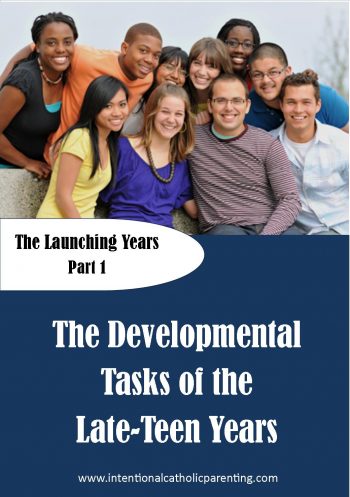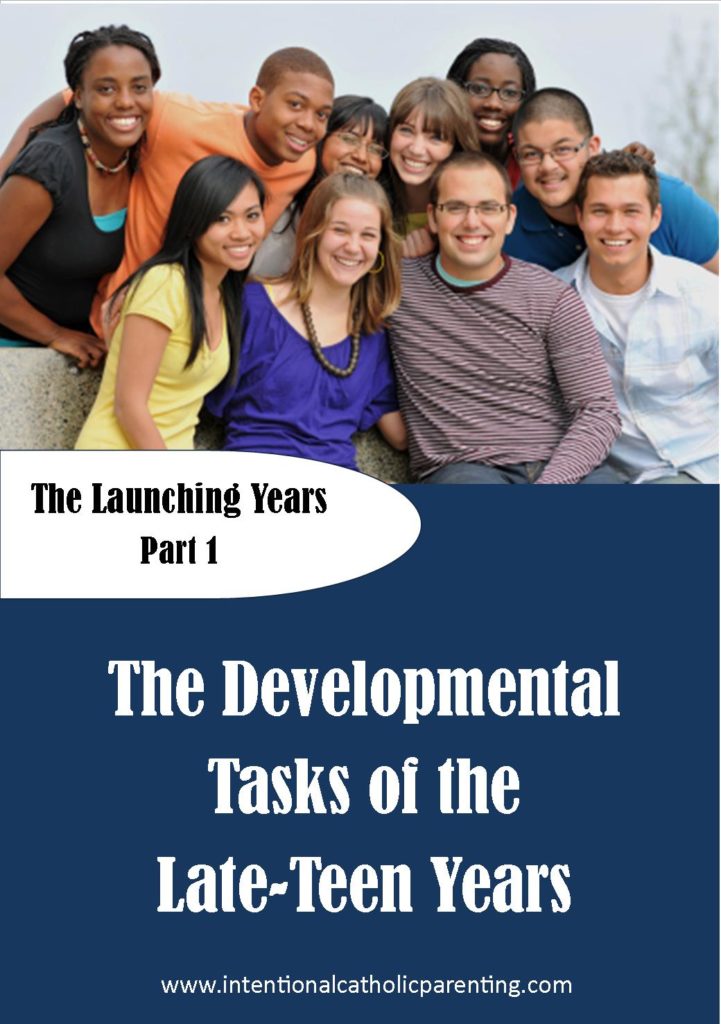When I first started writing about parenting, my oldest child Aidan was about 11 or 12 and I had a baby. Now that oldest child is 18 and about to launch from the nest. He begins college in the fall. As I adjust to this reality, I find myself reflecting on the lessons I have learned about the late teen years. I’ve discovered that older teens have “developmental tasks” that are very unique to them. Older teens (17-19) are very different from young teens (13-15); what they need from their parents is different.
In this post (Part 1), I will lay out 3 of the more important developmental tasks of the late teen years, then in Part 2 I’ll talk about what parents of younger kids can do to lay the groundwork for a healthy, well-adjusted transition to early adulthood.
Obviously there are more than 3 developmental tasks, but these are the 3 that have most affected my son in the last 6 months or so. For many of you, the late teen years seems very far away, but I hope you’ll find something valuable to hold on to as I share my experience of the launching process in the next year!
1. Moving Toward Interdependence
Many parents assume that the ultimate goal of parenting is to raise their child to be independent. This is surely part of it. We want our children to develop a sense of confidence that they can make it on their own. However, our culture has taken the independence thing too far. Kids (and grown-ups!) are commonly so narcissistic and self-involved that it makes community building difficult. The age of the selfie is the age of ME. While Americans, in particular, admire self-starters and like to focus on the unique qualities in each person, being independent does not require you to be self-absorbed.
The Church reminds us that human beings are called to interdependence not radical independence. Interdependence requires an ability to care for others. If you are only comfortable getting your own needs met, but lack the capacity to be there when your friends and family need help, you will become a drain on everyone around you as you mature. It’s perfectly normal for an infant to be completely dependent on others without giving anything back, but by the late teen years and early adulthood, our children should begin showing signs that they possess empathy and an ability to act on it.
When you are capable of interdependence, it also means you have an ability to stand on your own two feet coupled with the emotional strength to call out for help when you need it. Feeling that you are totally on your own and that you are weak if you need somebody is actually a sign of sub-optimal emotional health. Some people are actually uncomfortable allowing others to care for them. We want our children to feel comfortable both giving and receiving loving aid.
2. Clarifying Identity
Brad Sachs, PhD, writes that “[a]n important aspect of young adulthood is making explicit the self that the person has been sculpting and discovering since childhood. He must construct a psychic engine composed of desire and vision that will be strong enough to carry the freight of his soul forward in the face of life’s challenges” (Emptying the Nest, 25). This is what developmentalists call the emergent process.
The child has to answer for himself what he is really about; he has to confront his own limitations in addition to recognizing his strengths. This process continues throughout our lives, but the late teen years are a critical time for laying a strong foundation for our identity. If kids continue to depend on us or their peers for a sense of identity, if they have no idea what they want to do with their lives unless their peers or parents tell them what to do, they will never feel a sense of competence and confidence.
As a Catholic parent, I know that this clarifying of identity must include my child’s ownership of his faith. When we are spiritually mature, we feel a personal stake in our faith and we possess the desire to seek out what God wants for and from us and not just what we want. Aidan has to take what his family and childhood friendships have given him and make it own, and then he needs to seek out God’s will for his life.
Aidan is currently discerning a vocation to the priesthood. When he began to consider this seriously in the last year, he seemed to have a sense of urgency about the question. He wanted to know NOW whether he has a calling. Aidan possesses a faith that I didn’t have at his age. He is willing to throw it all down for God, no matter what anybody thinks. But as a normal teenager, he is impatient! He realized through spiritual direction that the silence and ambiguity – the not knowing – is part of his path right now. He will go to college this year and keep these things in his heart, seeking further confirmation of his vocation.
3. Grieving
A new reality that I am confronting: the grieving process that happens when your child leaves the nest. Aidan is still at home and I have him for 8 more months, but the pain is already setting in. Every now and then, a wave of emotion comes over me as I visualize him clearing out his drawers, packing his suitcase, and setting out on his own. Even when he returns home for Christmas and summer breaks, things will be different, and I know this. His childhood is ending and my role is changing. So I am learning to understand the process myself so that I’m not caught off guard!
Something I did not appreciate until recently: Aidan has to grieve as well. As he contemplates leaving home, I can see that he is both excited and scared. This ambivalence is completely normal. Kids should feel a sense of possibility and wonder about their future as they leave home, but they are also leaving something behind – the security and safety of childhood – and they need to recognize this. This loss is real and difficult.
Aidan goes through ups and downs as he faces leaving. He asks me if I will miss him. He knows the answer, but he just needs to hear me say it. He doesn’t want us to forget him! He has toyed with the idea of NOT leaving. He considered staying home and attending our local community college, but after pressing him a bit about this idea, I could see that he was thinking of staying home because he was fearful that he couldn’t make it on his own in college and not that he felt it was the best option for him. We have a great community college right in town, so if any of my kids determines that is the best path for them, I will support them without reservation. However, they should not stay home out of fear.
So I had to give Aidan a little nudge to the edge of the nest. Of course, the selfish part of me wanted to say YES YOU SHOULD DEFINITELY STAY HOME, but I am grateful for spiritual direction which helps me examine my true motivations for things. I know deep down that Aidan needs to go off to one of these great colleges that has accepted him. His intellectual and spiritual gifts will flourish in that environment and he is truly ready for it, even if he doubts it at times.
Aidan just needs to grieve his childhood. It is no longer appropriate for me to take care of him day in and out. It’s time for him to do his own laundry, make his own doctor’s appointments, and to keep his own schedule.
It’s time for him to fly.
I have to help him grieve. This is one of my big tasks as a mom of a launching young adult. If kids don’t grieve this loss, they are vulnerable to depression, addiction, underachievement, and other scary things.
Next time: how to raise kids who launch successfully from the nest!


